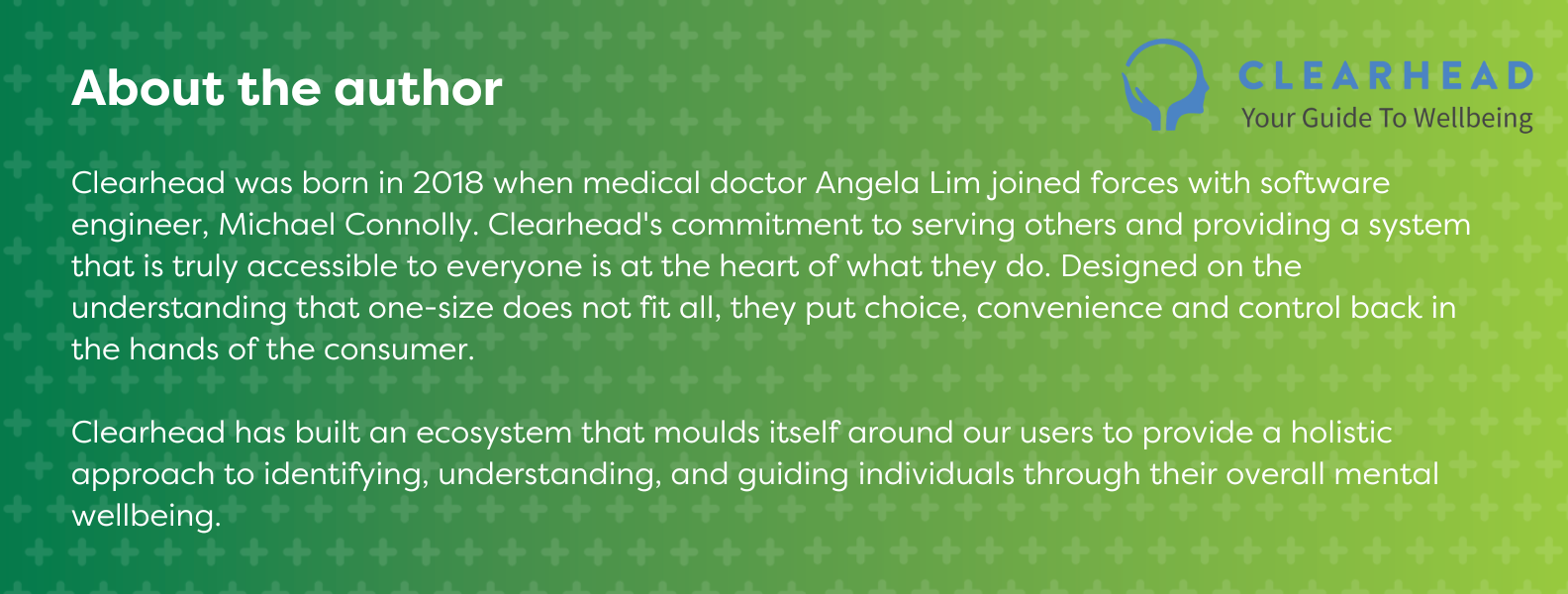Through our partnership with Clearhead we have the capability to support our Member's mental wellbeing by connecting them to the appropriate support they need when they need it. This game-changing platform, allows our Members to understand why they may be feeling anxious, stressed, tired or down. And then supports them to be proactive and resilient with their mental health.
The team behind Clearhead are psychologists, doctors, psychiatrists, counsellors, and researchers who are committed to providing quality mental health support for employees, students and everyone in between.
So we are delighted to be able to feature some of their articles within our blogs.

This article is published in full from Clearhead and asks the question - are we living with purpose in our lives and can we recognise when we are not...
Mark Twain once wrote that the two most important days in your life are the day you’re born and the day you find out why. Having purpose in our lives is important for health and wellbeing, and it provides motivation and satisfaction when we can achieve it.
Most people will spend around a third of their lives at work. Apart from sleeping, no other activity accounts for as much of your time as your work will. For this reason, work has perhaps the biggest impact on your inner sense of satisfaction and your ability to live according to your purpose.
Your working career is a big opportunity to do something meaningful that gives you genuine satisfaction. Unfortunately, even when we start out pursuing our dreams, they can often become less than what we’d imagined.
McKinsey research found that 70% of employees said their sense of purpose is defined by their work. But two-thirds of respondents said the COVID pandemic caused them to reflect on their purpose in life, and nearly half said they were reconsidering their choice of work.
COVID is one of many possible triggers that may have caused you to question if you’re living to your purpose.
Success vs Purpose
One of the great problems with work and purpose is that doing well in your career doesn’t always satisfy your inner-most needs. Coach, facilitator and educator Shruthi Vijayakumar explained the problem that exists between success at work and finding purpose in a recent Clearhead webinar.
“We live in a pretty modern capitalist context…where success is very much viewed as an accumulation of wealth. And if it’s not money it’s still very much an accumulation of stuff, be it power, privilege, status, partners or a house.”
As she explains, these things don’t necessarily make us happy. And, as soon as we achieve something tangible, we tend to move quickly on to pursuing the next thing. So we’re constantly seeking external items and we don’t savour our achievements in any way that provides lasting satisfaction.
Our careers are vehicles for the life we want to live, in that the money we earn enables us to live the lifestyle that matters to us. But when work itself isn’t giving us satisfaction, it often doesn't seem worth it.
This can be said even when we’re “succeeding” by other measures - if we’re earning good money or progressing up the career ladder. If that success requires doing things we don’t want to do, or that don’t light us up, it can sometimes feel underwhelming, and leave us flat.
In an ideal scenario, we’re able to succeed at work while also achieving our purpose. Consider it the other way around - the more we can live our purpose, the more we’ll inevitably succeed at work.
Workplace Purpose vs Individual Purpose
Another common issue when people feel they’re not living to their purpose is when the goals and values of their employer don’t match their own. Gallup describes how employees fulfil their purpose by using the things they’re best at to achieve things they care about. In order to do that, you need to know:
- What you care about most and how it connects to the company purpose
- What you do best and how it can contribute to what you care about
However, in another report, Gallup found that less than half of employees strongly agree that they know what their o
rganisation stands for and what makes it different, and only 27% of employees strongly believe in their company's values.
We need to be able to recognise how our individual purpose contributes to the overall company goals, which we also need to care about achieving.
Signs you’re not living your purpose
In a McKinsey survey, 89% of respondents said they wanted more purpose in their lives. Frontline staff were much more likely to say they were not living their purpose in their day-to-day work compared to upper level management.
Not living your purpose is fairly common, and there are varying degrees to which this can be true. Many people will have some tolerance for living less than 100% of their purpose. But how much less are you prepared to accept?
In the Clearhead webinar, Shruthi Vijayakumar talks about some of the signs of not living your purpose:
- You always want something. Achieving tangible rewards provides only momentary satisfaction before we move on to the next thing.
- You feel done. You might be burnt out, tired, or just over it. For whatever reason, you feel like the effort you’re making at work just isn't worth it anymore.
- You don’t have boundaries (or they keep getting broken). Without having boundaries that you stick to, you can end up working long hours and prioritising work ahead of things that are actually more important to you. You might be able to do this for a time, but it’s difficult to maintain consistently.
- You’re not living up to your values. Shruthi takes the example from Stephen Covey’s The 7 Habits of Highly Effective People of, what do you want people to say about you at your funeral? And if you died tomorrow, would they actually say those things? This is a good test to identify whether your life reflects the things that matter most to you.
Recognising your purpose
If you feel you may not be living your purpose, it’s entirely feasible that you don’t really know what your purpose is. HBR research has found fewer than 20% of leaders have a strong sense of what their purpose is.
Another scenario is you have an idea of what your purpose is, but it’s hard to put it into action. For example, if you feel your purpose is to help people, what people do you want to help? And how do you want t
o help them?
So if you’re not sure, or you’re not sure how to incorporate it into your work, how can you figure out what your purpose is? For a start, consider Stephen Covey’s funeral scenario above, and work backwards to think about how you can use your career to enable the things you hold dearest to be said about you.
Other options include:
- Do a strengths test. A strengths test helps you to recognise the things you are naturally best at. Gallup claims people who do what they’re best at every day are six times as likely to be engaged in their job, and three times as likely to report having an excellent quality of life.
- Find the common themes in your life. Think about what you loved as a child, before the idea of a career came along. What are the challenging experiences of your life, and what do you enjoy doing now? It can help to consider these themes in a group - it’s easier to bounce ideas around and take inspiration from others.
- Identify what you care most about. What gets you excited? Who do you want to make proud? What do you think the world has gotten wrong? What do you really value? If money didn’t matter, what would you do?
- Consider the impact you want to have on the world. Focus on the difference you want to make. How could you change things or make the world better? You can go smaller scale if you want, and think about how you’d improve your workplace if you could.
In asking yourself these questions, Shruthi Vijayakumar recommends making the time to be still and alone and really tuning into how di
fferent things make you feel. “It’s quite amazing how much we actually know if we create space to tune into the inner wisdom that guides us moment to moment,” she says.
She also touches on the need to let go of the need for external validation, or the understanding of others. People close to you may not understand your choices, but they don’t always need to. Pursuing your purpose will take resilience, and you can expect to be challenged along the way.
But acknowledging and prioritising your self-worth as you see it is a powerful thing, and it can really lead you to a fruitful and fulfilling life.
Clearhead’s Finding Purpose tool
At Clearhead, they’ve seen a large number of people struggling with finding and articulating their purpose in a way that helps them start to work on achieving it. So they’ve developed a brand-new digital tool to help you do it.
The Finding Purpose tool is about helping you do exactly that; rediscovering the things that really matter to you and uncovering what motivates, inspires and drives you the most. Looking at your Relationships, Career, Routines, and Hobbies, Finding Purpose is designed to help your reconnect with your ‘why’ and better understand what makes you tick. It’s a powerful tool driven by AI and machine learning available 24/7 from Clearhead. Click here to register your interest in Clearhead and use the tool.





